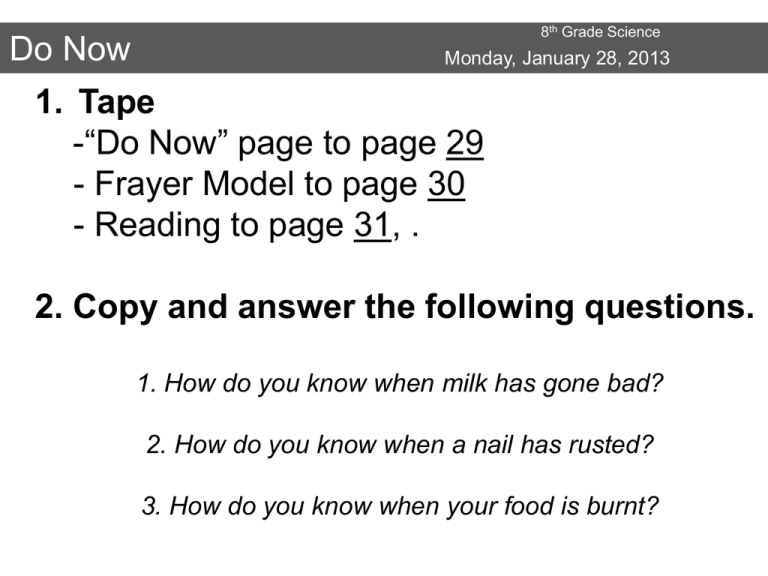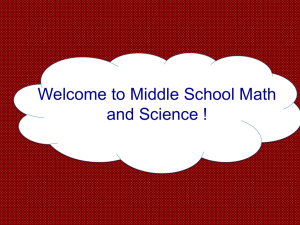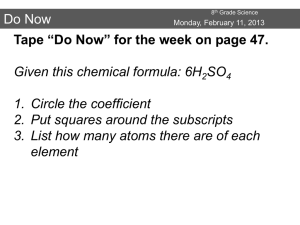chemical changes - O. Henry Science
advertisement

Do Now 8th Grade Science Monday, January 28, 2013 1. Tape -“Do Now” page to page 29 - Frayer Model to page 30 - Reading to page 31, . 2. Copy and answer the following questions. 1. How do you know when milk has gone bad? 2. How do you know when a nail has rusted? 3. How do you know when your food is burnt? Today’s Schedule 1. Do Now 2. Foldable 3. Physical and Chemical Changes Reading 4. Frayer Model 5. Project Vocabulary Electron Proton Neutron Electron Cloud Electrical Charge Valence Electron Nucleus Reactivity 8th Grade Science Monday, January 28, 2013 Pre-AP Homework Grade-Level Homework Poster/PowerPoint/ Popplet OR Model due FRIDAY Poster/PowerPoint/ OR Model due FRIDAY Essential Question How do we describe and classify matter? What happens to atoms in a chemical reaction? Today we will… 8th Grade Science Monday, January 28, 2013 8.5(E) investigate how evidence of chemical reactions indicate that new substances with different properties are formed Objective: Students will identify chemical changes in their everyday life and describe the difference between physical and chemical changes Foldable 8th Grade Science Monday, January 28, 2013 1. Fold pages 33 and 35 towards each other. 2. Cut each page in half 8th Grade Science Foldable Monday, January 28, 2013 Label each foldable flap Physical Properties Chemical Properties Physical Changes Chemical Changes 8th Grade Science Foldable Monday, January 28, 2013 1. Write a definition for physical properties 2. Describe 3 examples of physical properties 3. Repeat with chemical properties. *Use Reading on page 27/28 of INB as guide* Write definition Describe 3 examples Chemical Properties Physical Chemical Changes Changes 8th Grade Science Foldable Monday, January 28, 2013 Return to front and add pictures to physical and chemical properties Physical Properties Chemical Properties Physical Changes Chemical Changes Physical and Chemical Changes 8th Grade Science Monday, January 28, 2013 1. Read “Physical and Chemical Changes” 2. With a partner, complete the Frayer Model for Physical and Chemical Changes. Physical Changes Chemical Changes Brain-Pop Video 8th Grade Science Monday, January 28, 2013 Physical and Chemical Changes Do Now 8th Grade Science Tuesday, January 29, 2013 1. Read the Chemistry story at your table. 2. On your “Do Now” page, answer the following questions. 3. List 2 examples of physical properties in this story. 4. List 2 examples of chemical properties in this story 5. List 2 examples of physical changes in this story. 6. List 2 examples of chemical changes in this story. Today’s Schedule 1. Do Now 2. Marshmallow Man Lab 3. Finish Foldable Vocabulary Electron Proton Neutron Electron Cloud Electrical Charge Valence Electron Nucleus Reactivity 8th Grade Science Tuesday, January 29, 2013 Pre-AP Homework Grade-Level Homework Poster/PowerPoint/ Popplet OR Model due FRIDAY Poster/PowerPoint/ Popplet OR Model due FRIDAY h Essential Question How do we describe and classify matter? What happens to atoms in a chemical reaction? Today we will… 8th Grade Science Tuesday, January 22, 2013 8.5(E) investigate how evidence of chemical reactions indicate that new substances with different properties are formed Objective: Identify examples of chemical and physical changes. Making your Marshmallow Man 1. Insert a toothpick halfway into the flat side of one marshmallow to form the body. 2. Stick the second marshmallow on the remaining end of the toothpick. This sounds fun! 3. Insert four toothpicks into opposite sides of the body to make his arms and legs. 4. Place a marshmallow on a toothpick and stick half of the toothpick in the body to make the head. Action #1 = Pull 1. Pull the left arm of Marvin. Pull my arm! 2. Observations: Describe what happens when you pull the marshmallow arm of Marvin. Action #2 – Chew 1. Take off Marvin’s right arm and chew it. 2. Observations: What forces are you placing on the marshmallow as you chew? Chomp ***REMEMBER: Only record observations about your CHEWING, not swallowing. chomp! Action #3 – Digest Take Marvin’s left leg and digest it. Observations: What is happening as you are digesting Marvin’s leg? I’m yummy! Action #4 – Pound Pound the center of Marvin’s body. Observations: What force(s) are you applying to Marvin and how is it changing his appearance? ! OUCH Action #5 – Puncture Puncture a hole through Marvin’s head. Observations: What force(s) did you apply here and how did the marshmallow head react? But I already have three holes in my head! Action #6 – Amputate and Boil Amputate (cut off) Marvin’s right leg and carefully place it in the boiling water. Observations: How does the boiling water change Marvin’s leg? It’s HOT in here!!! 8th Grade Science Foldable Tuesday, January 29, 2013 1. Finish Conclusion Questions on Marshmallow Lab 2. Write a definition for physical changes 3. Describe 3 examples of physical changes 4. Repeat with chemical changes. *Use Reading on page 31 of INB as guide* Physical Chemical Properties Properties Write definition Describe 3 examples Chemical Changes 8th Grade Science Foldable Tuesday, January 29, 2013 Return to front and add pictures to physical and chemical properties Physical Properties Chemical Properties Physical Changes Chemical Changes Do Now 8th Grade Science Wed./Thurs, January 30 & 31, 2013 On your “Do Now” Page, answer: Are the following a physical or chemical change? Digestion Melting Dissolving Burning Rusting Freezing Today’s Schedule 1. 2. 3. 4. Do Now Chemical Changes Lab Conclusion Questions Project Work Time Vocabulary Electron Proton Neutron Electron Cloud Electrical Charge Valence Electron Nucleus Reactivity 8th Grade Science Wed./Thurs, January 30 & 31, 2013 Pre-AP Homework Grade-Level Homework Poster/PowerPoint/ Popplet OR Model due FRIDAY Poster/PowerPoint OR Model due FRIDAY Essential Question How do we describe and classify matter? What happens to atoms in a chemical reaction? Today we will… 8th Grade Science Wed./Thurs, January 30 & 31, 2013 8.5(E) investigate how evidence of chemical reactions indicate that new substances with different properties are formed Objectives: Identify 5 indicators of a chemical change. Chemical Changes Lab 8th Grade Science Wed./Thurs, January 30 & 31, 2013 At each station…. 1. Read the instructions 2. Perform each experiment carefully 3. Record observations 4. Answer the questions 5. Leave it clean 6. Wear your safety goggles Project Work Time 8th Grade Science Wed./Thurs, January 30 & 31, 2013 After you finish your lab… You should be working on one of the following, DUE FRIDAY!!! -PowerPoint or Poster (Pre-AP Popplet) -Model Atom -Research Paper Rough Draft (Pre-AP) -Research Do Now 8th Grade Science Friday, February 1, 2013 1. **Get out what you are turning in today for the project** 2. Tape the paper you picked up to page . 3. On your “Do Now” page… Describe 3 pieces of evidence that a chemical change has occurred. Today’s Schedule 1. Do Now 2. Quiz 3. Project Check Vocabulary Electron Proton Neutron Electron Cloud Electrical Charge Valence Electron Nucleus Reactivity 8th Grade Science Friday, February 1, 2013 Pre-AP Homework Grade-Level Homework Rough draft of Research paper due on Monday. Rough draft of Research paper due on Monday. Essential Question How do we describe and classify matter? What happens to atoms in a chemical reaction? Today we will… 8th Grade Science Friday, February 1, 2013 8.5(E) investigate how evidence of chemical reactions indicate that new substances with different properties are formed Objectives: Identify 5 indicators of a chemical change. 8th Grade Science Evidence of Chemical Change Friday, February 1, 2013 1. With a partner, fill in the table. 2. Sources that may help you: -Wed/Thurs Lab: Chemical Changes -Physical and Chemical Changes Reading -Foldable Observation Drawing Example The Unit Organizer NAME 4 BIGGER PICTURE DATE Recognizing patterns help predict what will happen next and what can change overtime. Energy can change forms and transfer from one object to another 2 1 LAST UNIT /Experience 3 CURRENT UNIT UNIT SCHEDULE 5 /Experience Force & Motion Characteristics of the Universe 8 NEXT UNIT UNIT MAP understanding that all matter in the universe is made up of elements made up of and illustrated by IMPORTANT TERMS: Demonstrating Investigating Describing Interpreting Recognizing 6 UNIT 7 What isn’t chemistry? Why should I care about physical and chemical changes in my everyday life? Where does matter come from and where does it go to if it can’t be created or destroyed? How would scientists predict the properties of a new element & where would it fit on the Periodic Table? What do I have in common with pencil graphite and diamonds? What would the biosphere be like without the 8 common elements in contains? proton neutron reactivity RELATIONSHIPS UNIT QUESTIONS atom nucleus valence electron Law of Conservation of Mass physical vs chemical change physical vs chemical property coefficient atomic number reactant subscript electron product electron cloud: shell, orbital, energy level






